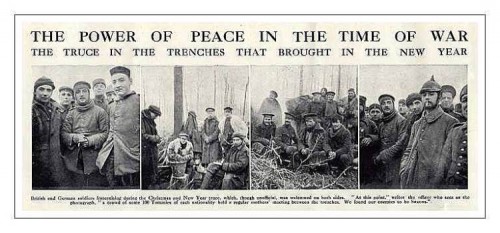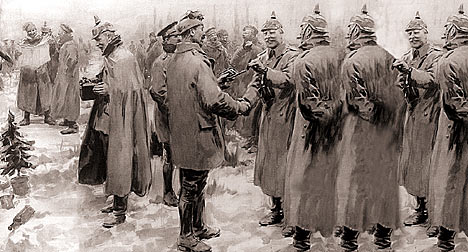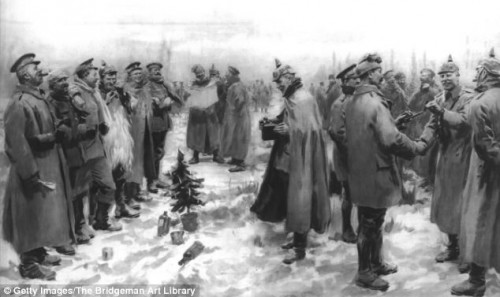December 25, 1914
One day when enemies stopped fighting

New Year’s Eve 2012, I was privileged to be in the audience when a small group of performers offered a song I’d never heard. Christmas In the Trenches so moved me, I came home that night and immediately looked it up. Google, once again, to the fore.
The song was written by John McCutcheon in 1989, and is sung by him in any of these YouTube videos:
Christmas In the Trenches sung twice
Posted to YouTube by RIDEM25, this 6:28 video takes us through the song twice with orchestration and pictures of WWI sites, plus a few modern era photos of those same sites.
Christmas In the Trenches sung twice, plus singer-songwriter introduction
Posted to YouTube by John Huffman, this 6:49 video gives us the composer himself telling the story of how he wrote the song and how he’d met a few German vets who specifically came to show of his to hear him sing. We hear the song twice, with scenes from a re-enactment of the day and newspaper clippings from the era.
Christmas In the Trenches sung three times
Posted to YouTube by gail242000, this 7:40 video takes us through the song three times, twice with pictures from WWI, then once again with pictures from today’s many wars.
I’ll post the lyrics at the end, FYI.
The song left me with the impression — and so I’ve believed for the past year — that this was a single incident. That in one trench, somewhere along the Western Front in 1914, German soldiers made an overture to their British enemies no more than 20 meters away, and they were acknowledged in a most heartwarming way.

HOWEVER, in preparing this blog, I’ve learned more. And the facts are even more remarkable than the story conveyed in song.
- This was not a one-time event. The song sums up the many informal cease-fires that occurred all along the 27-mile Western front. One report, later, said it was the entire Fifth Division.
- The Pope had called for a universal cease-fire on Christmas Day. But no one knew if his call would be followed. If anyone has made a connection, I haven’t found it.
- The British troops were professional soldiers; the Germans, were mostly conscripts.
- Photos of these gatherings made it into newspapers throughout the Western world.
If you want to get a fuller sense of the story, I recommend the documentary/re-enactment, The Christmas Truce. It’s an hour, but hook up your Apple TV. It’s worth it. And, unlike Miracle on 34th Street, it’s a true account of the “one day that shook the world.”
Another link to the same documentary is here.
A seven minute documentary/re-enactment can be found here.
Additional points I learned from the documentaries:
- Temperatures dropped below freezing; minus 4, some said.
- In December alone, the Germans had lost nearly 6,000; British, nearly 9,000. Yet it was the Germans who initiated these truces, over and over.
- Over a million soldiers would die on the Western front in 1914. By the end of the war, half of all soldiers would be killed or wounded.
- In one story, the two sides used the truce to bury their dead, and they buried them together in the “no man’s land” with a joint Christian service, alternating the recitation of The Lord’s Prayer in two languages.
I also began to understand what these soldiers had to fear from their own commanders by, essentially, “fraternizing with the enemy,” a treasonable offense, punishable by death.
- Up to half of the German front line was, at one time, “fraternizing with the enemy.”
- It’s unclear how many Brits. But we do know that when Commander General Horace Smith-Dorrien attempted to initiate court martial proceedings against some, he found too many had been involved for him to make an example of any one. As a result, not a single court martial occurred.
- In some quarters, the truce lasted days. In a few cases, into January. But, in the end, eventually, the war resumed when a Sgt. Collins was shot and killed on his way back from taking cigarettes to the Germans. The truce was over.

Here are the lyrics and here is the recording, again
My name is Francis Tolliver. I come from Liverpool.
Two years ago the war was waiting for me after school.
To Belgium and to Flanders, to Germany to here,
I fought for King and country I love dear.
It was Christmas in the trenches where the frost so bitter hung.
The frozen fields of France were still, no Christmas song was sung.
Our families back in England were toasting us that day,
Their brave and glorious lads so far away.
I was lyin’ with my mess-mates on the cold and rocky ground,
When across the lines of battle came a most peculiar sound.
Says I “Now listen up me boys,” each soldier strained to hear
As one young German voice sang out so clear.
“He’s singin’ bloody well you know,” my partner says to me.
Soon one by one each German voice joined in, in harmony.
The cannons rested silent. The gas cloud rolled no more,
As Christmas brought us respite from the war.
As soon as they were finished, a reverent pause was spent.
“God rest ye merry, gentlemen” struck up some lads from Kent.
The next they sang was Stille Nacht. “Tis Silent Night,” says I.
And in two tongues one song filled up that sky.
“There’s someone comin’ towards us,” the front-line sentry cried.
All sights were fixed on one lone figure trudging from their side.
His truce flag, like a Christmas star, shone on that plain so bright,
As he bravely strode, unarmed, into the night.
Then one by one on either side walked into no-man’s-land.
With neither gun nor bayonet, we met there hand to hand.
We shared some secret brandy and wished each other well,
And in a flare-lit soccer game, we gave ’em hell.
We traded chocolates, cigarettes and photographs from home,
These sons and fathers far away from families of their own.
Young Sanders played his squeezebox and they had a violin,
This curious and unlikely band of men.
Soon daylight stole upon us and France was France once more.
With sad farewells, we each began to settle back to war.
But the question haunted every heart that lived that wondrous night,
“Whose family have I fixed within my sights?”
It was Christmas in the trenches where the frost so bitter hung.
The frozen fields of France were warmed as songs of peace were sung.
For the walls they’d kept between us to exact the work of war,
Had been crumbled and were gone forever more.
Oh, my name is Francis Tolliver. In Liverpool I dwell.
Each Christmas come since World War One I’ve learned its lessons well.
That the ones who call the shots won’t be among the dead and lame.
And on each end of the rifle, we’re the same.
— John McCutcheon “Christmas in the trenches” 1989
May this Christmas season find you and yours at peace.
Marian Beaman
Thank you for mining these gems from our history, fair researcher. The audio provides an additional dimension of insight. Again, thank you–peace to you and yours this Christmas season.
Janet
thanks, Marian. I was so smitten with this song last year, I knew I needed to post something about it. And, in getting ready for the blog, I got quite into it. Must have spent most of one Sunday afternoon. But it’s an important story, I think. One I’d love to see shared more often.
My fond wishes to your and yours this holiday season: Peace, Joy, and Thanksgiving.
A Day When Enemies Stopped Fighting |
[…] a repeat of last year’s Christmas season blog. I thought it was particularly timely this year. and as I put it together, a quote from Margaret […]
Robert Oppenheimer
Hi Janet
I heard John McCutcheon sing this in the mid 80s in Ann Arbor Michigan, I believe it was on an album he put out in 1984. To have met a group of WW1 era German soldiers (as he described at the concert I attended) that had to have been in the late 1970s or early 1980s just due to their age.
I too find it an inspiring song and I woke up this morning with it in my head and found your blog.
Thanks for helping remember this important event in the human history of war and peace.
Robert in BC Canada
Janet Givens
Hello Robert, and welcome.
How great for you to have heard John McCutcheon in person, and hear him tell the story again. It is a powerful song, and really not too far off from the truth. With just the song behind me, I hadn’t realized that this this type of activity had happened up and down the front line, in numerous places. I wrote about it again the following year (dec, 2014). https://janetgivens.com/a-day-when-enemies-stopped-fighting/ You might want to check that one out too. See how much more I’d learned. I hope you’ll come back againn and join the conversation. I (try to) post regularly on Wednesday mornings.
Valerie
I really love this song too – in fact, I helped present this song along with slides to my community as an awareness-raising event along with the history studies of my friend’s daughter. I have an very old and dear friend – no longer living but she was at the time of the presentation – who told me later that her husband was in one of those trenches during a Christmas truce. Amazing!
Janet Givens
Hello Valerie,
I’m so tickled you found this fairly old blog post. It’s on one of my favorite topics — how peace can come about through the actions of individuals acting in good will. I’m also thrilled to know there are teachers out there who try to share this story. Thanks for sharing yours here. I hope you’ll come back.
» Annual Christmas Eve Story
[…] the year has flown. The following story is one I’ve shared before, first in 2013 and again in […]
Kendyll Stansbury
I, too, love the song, and hear it live every year when John McCutcheon comes to the San Francisco Bay Area. Most of us are longtime John fans, and can sing along on his older songs. But for this song, which he sings near the end of the concert, you can hear a pin drop. It has a sort of sacred feeling to it.
But I’m writing to tell you about the first time I heard the song, at the Vancouver Folk Festival around 2007. I think it was recently after he wrote the song. The story he tells about the German soldiers (“And I mean those guys were really old!”) is interesting but I also like the story about how he came to write the song, which I’ve never heard him tell again.
He was doing a sound check before a concert, and he had a few hours before the concert began, and prepared to go backstage and pick up his book and read. The janitor was sweeping. She asked him, “What kind of music do you do?” He told her that the did story songs. She asked him to sing her a story song, and he did. She then said, “That wasn’t much of a story.” He said, “Tell me a better one.” So she leaned on her broom and told him about her brother in WWI and the night he met the German soldiers in No Man’s Land. He said that he wrote the song in a few minutes; it was like a gift given him.
I went to Belgium for Christmas 2014 to celebrate the 100th anniversary. (The Christmas truces occurred on the France-Belgian border) I was in Ypres (or Ieper, in Flemish) Belgium. Every night during the years of WWI, at the gate where British solders marched off to the war, they are commemorating one soldier who died that night. (This is sponsored by the British army). They commemorated a solder who died when he went into No Man’s with other solders and was shot dead by a German soldier. Needless to say, the other soldiers fled back to the trenches.
I did get a book on the Christmas Truces at the In Flanders Field museum in Ypres. It quoted letters from soldiers who wrote home about them. Many Germans had worked in England in restaurants, and sometimes, the British soldiers met German soldiers they knew. It also said that there were two types of batallions. The Prussians were the more professional solders, and no truces happened where they were stationed. It also said that Adolf Hitler was a private on one of the lines, and he disapproved of the truce in his place, but refrained from shooting at the soldiers in No Man’s Land, which is how some German solders expressed their disapproval.
Thank you for all of the links to information about my beloved song.